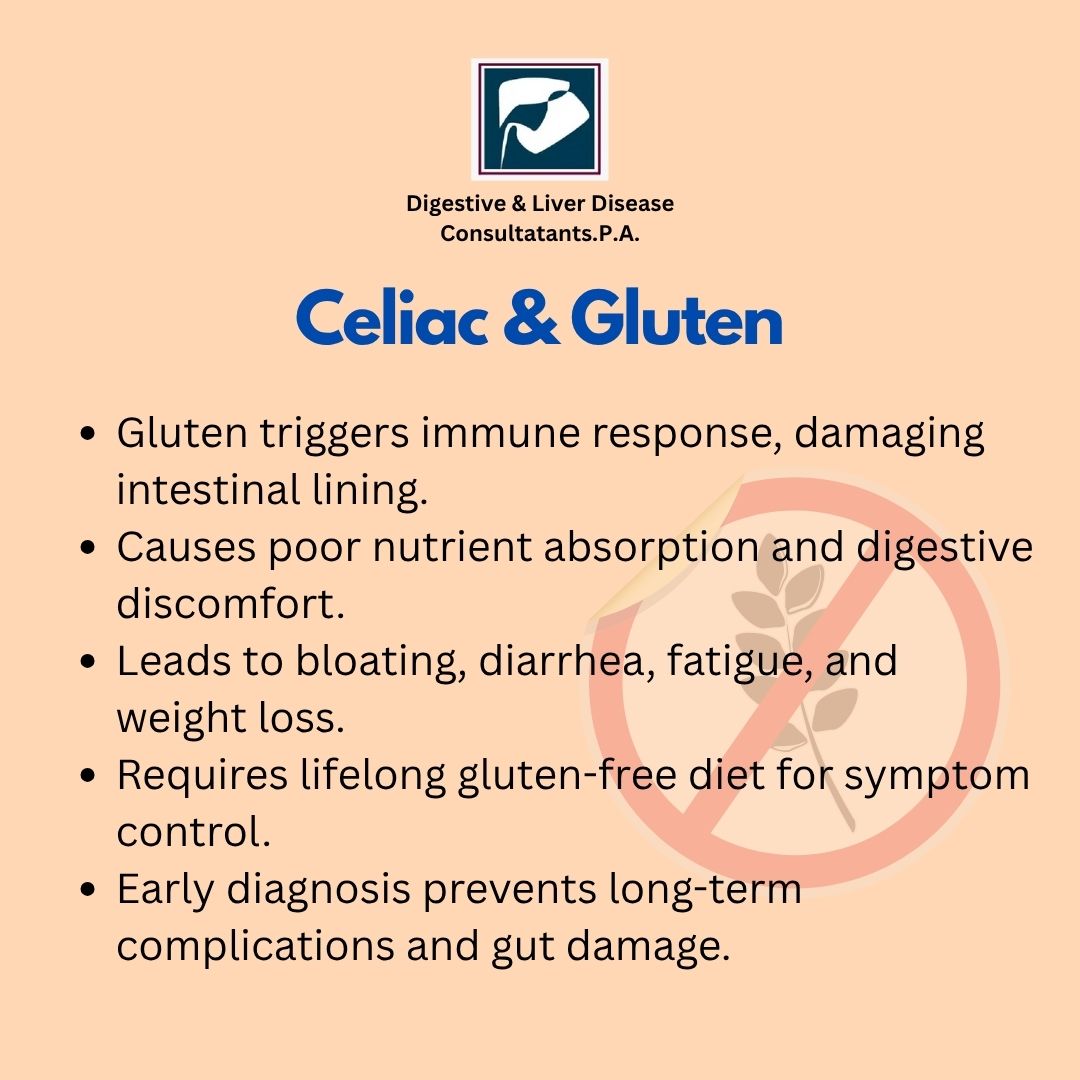Celiac disease is a serious digestive condition that affects millions of people worldwide. It’s more than just a sensitivity to gluten—it’s an autoimmune disorder where eating gluten triggers damage in the small intestine. If left undiagnosed or untreated, celiac disease can cause long-term health problems. At Digestive & Liver Disease Consultants, P.A., we specialize in identifying and treating digestive disorders like celiac disease to help patients live healthier, more comfortable lives.
In this blog, we’ll break down what celiac disease is, how gluten affects the digestive system, and what you can do to manage it effectively.
What Is Celiac Disease?
Celiac disease is an autoimmune condition in which the immune system mistakenly attacks the small intestine when gluten is consumed. Gluten is a protein found in wheat, barley, and rye. When people with celiac disease eat foods that contain gluten, their body responds by damaging the lining of the small intestine, particularly the villi—small finger-like projections that absorb nutrients.
Over time, this damage prevents the body from properly absorbing essential nutrients, which can lead to malnutrition, weight loss, and various other health issues.
Symptoms of Celiac Disease
Celiac disease symptoms can vary widely from person to person. Some people may experience severe digestive problems, while others might have symptoms that seem unrelated to digestion.
Common digestive symptoms include:
- Bloating and gas
- Diarrhea or constipation
- Abdominal pain
- Nausea and vomiting
- Fatty or foul-smelling stools
Other signs that might not seem directly related to digestion include:
- Fatigue
- Anemia (low red blood cell count)
- Skin rash (dermatitis herpetiformis)
- Joint pain
- Headaches or migraines
- Unexplained weight loss
- Depression or anxiety
Because the symptoms vary so much, many people live with celiac disease for years before getting an accurate diagnosis.

How Gluten Affects the Digestive System
In a healthy digestive system, the small intestine absorbs nutrients from food efficiently. But in someone with celiac disease, gluten triggers the immune system to attack the small intestine. This results in inflammation and damage to the villi, making it difficult for the body to absorb nutrients like iron, calcium, and vitamins.
This damage doesn't just affect digestion—it can impact your entire body. Poor nutrient absorption can lead to serious issues such as:
- Weak bones (osteoporosis)
- Fertility problems
- Delayed growth in children
- Nerve damage (neuropathy)
Even tiny amounts of gluten can cause harm, so people with celiac disease must strictly avoid all sources of gluten to protect their digestive health.
How Is Celiac Disease Diagnosed?
Diagnosing celiac disease usually involves a combination of blood tests and a biopsy of the small intestine.
Blood tests: These check for certain antibodies that are usually present in people with celiac disease.
Endoscopy with biopsy: If blood tests are positive, a gastroenterologist may recommend an upper endoscopy to take a small tissue sample from your small intestine to check for damage.
Important: Do not stop eating gluten before testing, as this can lead to false-negative results. Always talk to a specialist before changing your diet.
Living with Celiac Disease: The Gluten-Free Diet
The only effective treatment for celiac disease is a strict gluten-free diet. This means completely avoiding any foods or drinks that contain wheat, barley, or rye.
Gluten-containing foods to avoid:
- Bread, pasta, and baked goods made with wheat
- Beer and malt beverages
- Cereals containing wheat or barley
- Soy sauce (unless labeled gluten-free)
Safe gluten-free foods include:
- Fresh fruits and vegetables
- Rice, quinoa, corn, and oats (if labeled gluten-free)
- Lean meats, fish, and poultry (unbreaded and unprocessed)
- Eggs, nuts, and legumes
- Dairy products (check for added ingredients)
Tips for managing a gluten-free diet:
- Always read food labels carefully
- Watch out for cross-contamination in kitchens and restaurants
- Work with a dietitian to ensure balanced nutrition
- Educate family and friends about your dietary needs
Living gluten-free can feel overwhelming at first, but with the right guidance and support, it becomes manageable. Most people notice a significant improvement in their symptoms within weeks of starting a gluten-free diet.
Complications of Untreated Celiac Disease
If left untreated, celiac disease can lead to long-term complications, including:
- Malnutrition
- Osteoporosis
- Infertility or pregnancy complications
- Neurological issues like numbness or tingling
- An increased risk of certain cancers, such as intestinal lymphoma
This is why early diagnosis and strict dietary management are so important.
Celiac Disease vs. Gluten Sensitivity
It’s important to note that not everyone who reacts badly to gluten has celiac disease. Some people have non-celiac gluten sensitivity, which causes similar symptoms but without the autoimmune response or intestinal damage.
Only proper testing by a healthcare professional can confirm whether you have celiac disease or a different digestive issue.
How Digestive & Liver Disease Consultants, P.A. Can Help
At Digestive & Liver Disease Consultants, P.A., we specialize in diagnosing and treating complex digestive conditions like celiac disease. Our experienced team of board-certified gastroenterologists offers comprehensive care, including advanced diagnostics, personalized treatment plans, and ongoing support to help you manage your health effectively.
We understand the impact that digestive disorders can have on your daily life. That’s why we focus not just on treating your symptoms, but on helping you feel better long-term. Whether you're dealing with unexplained symptoms or have already been diagnosed with celiac disease, our team is here to guide you every step of the way.
Conclusion
Celiac disease is a serious condition that affects how your body digests and absorbs food. When you have celiac disease, even a small amount of gluten can harm your digestive system and lead to a range of health problems. Fortunately, with proper diagnosis and a strict gluten-free diet, people with celiac disease can live full, healthy lives.






